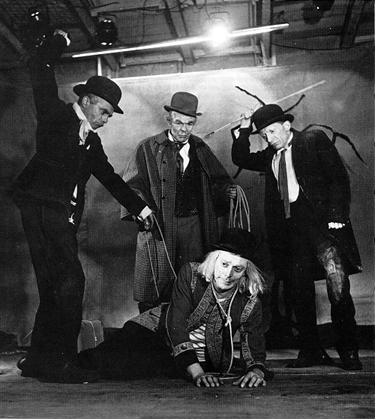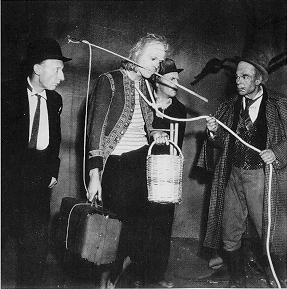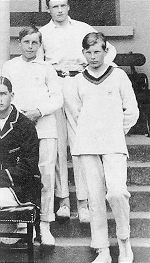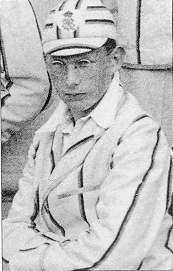waiting for Godot
In 1955-56 was produced the second renaissense of english theatre.
This kind of teathre was denominated ABSURD. This play, Waiting for Godot,
is the most representative.
The play consists of four raffish characters, Vladimir, Estragon, Pozzo
and Lucky, an innocent boy who twice arrives with a message from Godot,
a naked tree, a mound or two of earth and a sky. Two of the characters
are waiting for Godot, who never arrives. Two of them consist of a flamboyant
lord of the earth and a broken slave whimpering and staggering at the end
of a rope.
Since "Waiting for Godot" is an allegory written in a heartless modern
tone, a theatre-goer naturally rummages through the performance in search
of a meaning. It seems fairly certain that Godot stands for God. Those
who are loitering by the withered tree are waiting for salvation, which
never comes.
The rest of the symbolism is more elusive. But it is not a pose. For
Mr. Beckett's drama adumbrates--rather than expresses--an attitude toward
man's experience on earth; the pathos, cruelty, comradeship, hope, corruption,
filthiness and wonder of human existence. Faith in God has almost vanished.
But there is still an illusion of faith flickering around the edges of
the drama. It is as though Mr. Beckett sees very little reason for clutching
at faith, but is unable to relinquish it entirely.
Although the drama is puzzling, the director and the actors play it
as though they understand every line of it. The performance Herbert Berghof
has staged against Louis Kennel's spare setting is triumphant in every
respect. And Bert Lahr has never given a performance as glorious as his
tatterdemalión Gogo, who seems to stand for all the stumbling, bewildered
people of the earth who go on living without knowing why.
Although "Waiting for Godot" is an uneventful, maundering, loquacious
drama, Mr. Lahr is an actor in the pantomime tradition who has a thousand
ways to move and a hundred ways to grimace in order to make the story interesting
and theatrical, and touching, too. His long experience as a bawling mountebank
has equipped Mr. Lahr to represent eloquently the tragic comedy of one
of the lost souls of the earth.
The other actors are excellent, also. E. G. Marshall as a fellow vagrant
with a mind that is a bit more coherent; Kurt Kasznar as a masterful egotist
reeking of power and success; Alvin Epstein as the battered slave who has
one bitterly satirical polemic to deliver by rote; Luchino Solito De Solis
as a disarming shepherd boy--complete the cast that gives this diffuse
drama a glowing performance.
You can see in this fragment two characters who are waiting but they
don't make anything, only wait, and don't know why. Their conversations
are strange, because they don't say anything, only words.
ANALYSIS OF THE PLAY:
Although very existentialist in its characterizations, Waiting for
Godot is primarily about hope. The play revolves around Vladimir and
Estragon and their pitiful wait for hope to arrive. At various times during
the play, hope is constructed as a form of salvation, in the personages
of Pozzo and Lucky, or even as death. The subject of the play quickly becomes
an example of how to pass the time in a situation which offers no hope.
Thus the theme of the play is set by the beginning:
Estragon: Nothing to be done.
Vladimir: I'm beginning to come round to that opinion.
Although the phrase is used in connection to Estragon's boots here,
it is also later used by Vladimir with respect to his hat. Essentially
it describes the hopelessness of their lives.
A direct result of this hopelessness is the daily struggle to pass the
time. Thus, most of the play is dedicated to devising games which will
help them pass the time. This mutual desire also addresses the question
of why they stay together. Both Vladimir and Estragon admit to being happier
when apart. One of the main reasons that they continue their relationship
is that they need one another to pass the time. After Pozzo and Lucky leave
for the first time they comment:
V: That passed the time.
E: It would have passed in any case.
And later when Estragon finds his boots again:
V: What about trying them.
E: I've tried everything.
V: No, I mean the boots.
E: Would that be a good thing?
V: It'd pass the time. I assure you, it'd be an occupation.
Since passing the time is their mutual occupation, Estragon struggles
to find games to help them accomplish their goal. Thus they engage in insulting
one another and in asking each other questions.
The difficulty for Beckett of keeping a dialogue running for so long
is overcome by making his characters forget everything. Estragon cannot
remember anything past what was said immediately prior to his lines. Vladimir,
although possessing a better memory, distrusts what he remembers. And since
Vladimir cannot rely on Estragon to remind him of things, he too exists
in a state of forgetfulness.
Another second reason for why they are together arises from the existentialism
of their forgetfulness. Since Estragon cannot remember anything, he needs
Vladimir to tell him his history. It is as if Vladimir is establishing
Estragon's identity by remembering for him. Estragon also serves as a reminder
for Vladimir of all the things they have done together. Thus both men serve
to remind the other man of his very existence. This is necessary since
no one else in the play ever remembers them:
Vladimir: We met yesterday. (Silence) Do you not remember?
Pozzo: I don't remember having met anyone yesterday. But to-morrow
I won't remember having met anyone to-day. So don't count on me to enlighten
you.
Later on the same thing happens with the boy who claims to have never
seen them before. This lack of reassurance about their very existence makes
it all the more necessary that they remember each other.
Estragon and Vladimir are not only talking to pass the time, but also
to avoid the voices that arise out of the silence. Beckett's heroes in
other works are also constantly assailed by voices which arise out of the
silence, so this is a continuation of a theme the author uses frequently:
E: In the meantime let's try and converse calmly, since we're
incapable of keeping silent.
V: You're right, we're inexhaustible.
E: It's so we won't think.
V: We have that excuse.
E: It's so we won't hear.
V: We have our reasons.
E: All the dead voices.
V: They make a noise like wings.
E: Like leaves.
V: Like sand.
E: Like leaves.
Silence.
V: They all speak at once.
E: Each one to itself.
Silence.
V: Rather they whisper.
E: They rustle.
V: They murmur.
E: The rustle.
Silence.
V: What do they say?
E: They talk about their lives.
V: To have lived is not enough for them.
E: They have to talk about it.
V: To be dead is not enough for them.
E: It is not sufficient.
Silence.
V: They make a noise like feathers.
E: Like leaves.
V: Like ashes.
E: Like leaves.
Long silence.
V: Say something!
One of the questions which must be answered is why the bums are suffering
in the first place. This can only be answered through the concept of original
sin. To be born is to be a sinner, and thus man is condemned to suffer.
The only way to escape the suffering is to repent or to die. Thus Vladimir
recalls the thieves crucified with Christ in the first act:
V: One of the thieves was saved. It's a reasonable percentage.
(Pause.) Gogo.
E: What?
V: Suppose we repented.
E: Repented what?
V: Oh . . . (He reflects.) We wouldn't have to go into the details.
E: Our being born?
Failing to repent, they sit and wait for Godot to come and save them.
In the meantime they contemplate suicide as another way of escaping their
hopelessness. Estragon wants them to hang themselves from the tree, but
both he and Vladimir find it would be too risky. This apathy, which is
a result of their age, leads them to remember a time when Estragon almost
succeeded in killing himself:
E: Do you remember the day I threw myself into the Rhone?
V: We were grape harvesting.
E: You fished me out.
V: That's all dead and buried.
E: My clothes dried in the sun.
V: There's no good harking back on that. Come on.
Beckett is believed to have said that the name Godot comes from the
French "godillot" meaning a military boot. Beckett fought in the war and
so spending long periods of time waiting for messages to arrive would have
been commonplace for him. The more common interpretation that it might
mean "God" is almost certainly wrong. Beckett apparently stated that if
he had meant "God," he would have written "God".
The concept of the passage of time leads to a general irony. Each minute
spent waiting brings death one step closer to the characters and makes
the arrival of Godot less likely. The passage of time is evidenced by the
tree which has grown leaves, possibly indicating a change of seasons. Pozzo
and Lucky are also transformed by time since Pozzo goes blind and Lucky
mute.
There are numerous interpretation of Waiting for Godot and a few are
described here:
Religious interpretations posit Vladimir and Estragon as humanity waiting
for the elusive return of a savior. An extension of this makes Pozzo into
the Pope and Lucky into the faithful. The faithful are then viewed as a
cipher of God cut short by human intolerance. The twisted tree can alternatively
represent either the tree of death, the tree of life, the tree of Judas
or the tree of knowledge.
Political interpretations also abound. Some reviewers hold that the
relationship between Pozzo and Lucky is that of a capitalist to his labor.
This Marxist interpretation is understandable given that in the second
act Pozzo is blind to what is happening around him and Lucky is mute to
protest his treatment. The play has also been understood as an allegory
for Franco-German relations.
An interesting interpretation argues that Lucky receives his name because
he is lucky in the context of the play. Since most of the play is spent
trying to find things to do to pass the time, Lucky is lucky because his
actions are determined absolutely by Pozzo. Pozzo on the other hand is
unlucky because he not only needs to pass his own time but must find things
for Lucky to do.
LIST OF CHARACTERS:
Estragon: Estragon is one of the two protagonists. He is a bum
and sleeps in a ditch where he is beaten each night. He has no memory beyond
what is immediately said to him, and relies on Vladimir to remember for
him. Estragon is impatient and constantly wants to leave Vladimir, but
is restrained from leaving by the fact that he needs Vladimir. It is Estragon's
idea for the bums to pass their time by hanging themselves. Estragon has
been compared to a body without an intellect, which therefore needs Vladimir
to provide the intellect.
Vladimir: Vladimir is one of the two protagonists. He is a bum
like Estragon, but retains a memory of most events. However, he is often
unsure whether his memory is playing tricks on him. Vladimir is friends
with Estragon because Estragon provides him with the chance to remember
past events. Vladimir is the one who makes Estragon wait with him for Mr.
Godot's imminent arrival throughout the play. Vladimir has been compared
to the intellect which provides for the body, represented by Estragon.
Lucky: Lucky is the slave of Pozzo. He is tied to Pozzo via a
rope around his neck and he carries Pozzo's bags. Lucky is only allowed
to speak twice during the entire play, but his long monologue is filled
with incomplete ideas. He is silenced only by the other characters who
fight with him to take of his hat. Lucky appears as a mute in the second
act.
Pozzo: Pozzo is the master who rules over Lucky. He stops and
talks to the two bums in order to have some company. In the second act
Pozzo is blind and requires their help. He, like Estragon, cannot remember
people he has met. His transformation between the acts may represent the
passage of time.
a boy: The boy is a servant of Mr. Godot. He plays an identical
role in both acts by coming to inform Vladimir and Estragon the Mr. Godot
will not be able to make it that night, but will surely come the next day.
The boy never remembers having met Vladimir and Estragon before. He has
a brother who is mentioned but who never appears.

Pierre Latour (Estragon), Roger Blin (Pozzo), Lucien Raimbourg, (Vladimir),
and Jean Martin (Lucky) in the first production of En attendant Godot
at the Théâtre de Babylone in 1953.

A scene from the first production of En attendant Godot at Paris'
Théâtre de Babylone in 1953, with Pierre Latour (Estragon),
Jean Martin (Lucky), Lucien Rambourg (Vladimir), and Roger Blin (Pozzo).
Endgame:
ANALYSIS
Endgame is the term used to describe an ending in chess where
the outcome is already known. Chess masters often study endgames in order
to guarantee themselves victory once they maneuver their opponent into
a certain position. Beckett, an avid chess fan, saw the parallel between
the chess endgame the final stages of life. He realized that death is the
final outcome and that regardless of how a person plays the game, he or
she will die. The imagery of chess is presented in the play through Clov
and Hamm who are red and Nagg and Nell who are white.
The stage setting is important because it has been likened to a skull.
The two windows on the back wall form the eye sockets of this skull, and
the characters represent the brain and memory. Thus the entire stage serves
as a metaphor for an aging mind.
This skull-like setting is complemented by several textual references
to Dante's Inferno. For instance, Clov comments at one point that they
are in a refuge between earth and sea, while Hamm observes, "That here
we're down in a hole." The text later adds that the sun is sinking, "down
among the dead," that they are beyond certain hills, and that beyond the
walls, "is the...other hell." The implication of placing the characters
in Dante's inferno is that they will be doomed to repeating the act of
their crime for all eternity. In typical Beckettian fashion, the crime
can be viewed as "life," meaning that they are doomed to repeat life forever.
The subject of Endgame is whether Clov will leave Hamm. Their
relationship, which alternates between slave/master and son/father, is
also a mutually beneficial one. Hamm provides food and shelter, whereas
Clov provides legs and eyesight. Part of the problem with Clov leaving
is that doing so is an act of suicide. If he leaves Hamm, he will not have
any food, and without someone to feed him, Hamm will die as well.
The relationship between Hamm and Clov is also confused by Hamm's biographical
story. Told daily and seemingly without an end (because a biography can
only truly be ended when the person is dead), the story seems to hint at
the possibility that Clov might be the boy alluded to. This is supported
in the text by Clov's comment, "And then he [the boy] would have grown
up." Hamm responds enigmatically with, "Very likely."
Beckett highlights one theme in particular, that of "finishing". This
theme is presented right in the opening moments, with Clov saying, "Finished,
it's finished, nearly finished, it must be finished." This same theme is
later echoed by Hamm. However, what soon becomes clear is that things remain
unfinished; actually finishing something represents death.
The theme of finishing ties in with the daily rituals and games. These
serve as a means of affirming life for the various characters; Clov knows
he is still not dead as long as Hamm demands that he look out of the windows.
Nagg and Nell do the same thing: Nagg asks Nell to kiss him as a way of
affirming that he and she are still in the same position they were in the
day before. Thus when both Nell and Clov ask, "Why this farce, day after
day?," we realize that they do nonetheless perform the ritual in order
to satisfy their own need to affirm their existence.
It is interesting and important that Nell dies. Although Hamm asks Clov
to kill him, he is unable perform the act. Thus Nell is the only character
able to escape this world. Her last word is "desert", which has several
interesting implications. Clov interprets this to mean that he should go
into the desert. This brings to mind Christ venturing into the desert for
forty days of temptation by the devil; perhaps Nell has given Clov a hint
as to how he can achieve salvation. However, Clov does not listen well
enough, and we soon learn that he did not understand everything that she
said to him.
One of the greatest fears that all the characters share is that of being
reincarnated or resurrected after death. Thus they make an effort to kill
all potential procreators such as the flea: "But humanity might start from
there all over again! Catch him, for the love of God!" This is taken to
the extreme in the form of trying to kill the the rat and later trying
to kill the little boy.
The emergence of the boy at the end has been interpreted by many critics
as a symbol of resurrection. Whether or not this is accurate, his appearance
does cause Hamm to say, "It's the end, Clov, we've come to the end. I don't
need you any more." However, Clov's eventual departure is thrown into doubt
at the very end when Clov does not actually leave the stage, but rather
remains standing in the doorway dressed to leave.
One of the things that Beckett said about Endgame is that it
is "Rather difficult and elliptic, mostly depending on the power of the
text to claw." He also pointed out that it is less hopeful than Waiting
for Godot. As one critic noted, Waiting for Godot is a despairing
play about hope, Endgame is a despairing play about despair. A further
difference is that the ambiguous "thing" replaces Godot in terms of tormenting
the characters. Hamm asks, "Do you not think this has gone on long enough?...This...this...thing."
Endgame
stands out as one of Beckett's best plays, and it happened to also be Beckett's
favorite play.
LIST OF CHARACTERS:
Hamm: A blind man who is no longer able to walk. He is in charge
of the shelter where all four characters are trapped, and he has control
over the food supply. He seems to be Clov's master, and is possibly also
Clov's father. His parents are Nagg and Nell. Hamm is very childish and
frequently demands that Clov perform little rituals for him such as looking
out the windows and describing what he sees. Both Hamm and Clov are linked
as a "pair", meaning that if one of them leaves, the other will die.
Clov: Clov serves at times as Hamm's menial, son, or beast. He
and Hamm engage in many verbal games throughout the play. He is paired
with Hamm because he can see and stand, whereas Hamm is blind and must
sit. Clov constantly tells Hamm that he is leaving, but he never does.
Nagg: Hamm's father, Nagg lives in an ashcan. He is paired with
his wife Nell, and he has to beg for food. Hamm bribes Nagg into listening
to a story, but then refuses to pay up.
Nell: Hamm's mother, she also lives in an ashcan which is situated
next to Nagg's can. Unfortunately, she cannot share any real physical contact
with Nagg because their cans are too far apart. Nell is the only character
who dies during the play.
happy days:
On a literal level the burden of "Happy Days" is soon told. As the curtain
goes up, Winnie, a woman no longer young, is embedded up to her bosom in
a mound of earth in an expanse of scorched grass. She chatters incessantly
to Willie, presumably her mate, who is all but unseen. She seeks to fill
the hours. She reminisces, comments, laughs, grumbles. She assures herself
that this is one of her happy days, when in fact she is on the verge of
tears.
In the second act she has sunk into the mound so that only her head
is visible, and now she cannot move it. Despite the desperation of her
predicament, this is another of her happy days. For at the end Willie,
dressed formally as if for a diplomatic function or a funeral, crawls out
and strives to reach her. Fruitlessly, of course. Mr. Beckett knows that
Winnie's hopes are false--and so does she.
Mr. Beckett's objective is anything but literal. "Happy Days" is surely
his allegory of the human condition. Poor Winnie babbling away pretends
that she has created order out of her odd incarceration. She is aware that
Willie's "marvelous gift" is to sleep. She calls to him anyhow: "Just to
know that in theory you hear me even though in fact you don't is all I
need." This is the mercy for which she pleads.
Among his principal plays, pioneering works in the Theater of the Absurd,
are Endgame (1957 ), Krapp's Last Tape (1959), Happy Days
(1961), Play (1964), Not I (1973), That Time (1976),
and Footfalls (1976). He has also written radio and television plays.
In his later stage and television plays, Beckett's style is so concise
that each work is ultimately reduced to a highly compressed and immensely
powerful image.
Beckett received the Nobel Prize for literature in 1969. His 16-volume
Collected
Works were published in 1970.


(c) Xerxes Mehta



